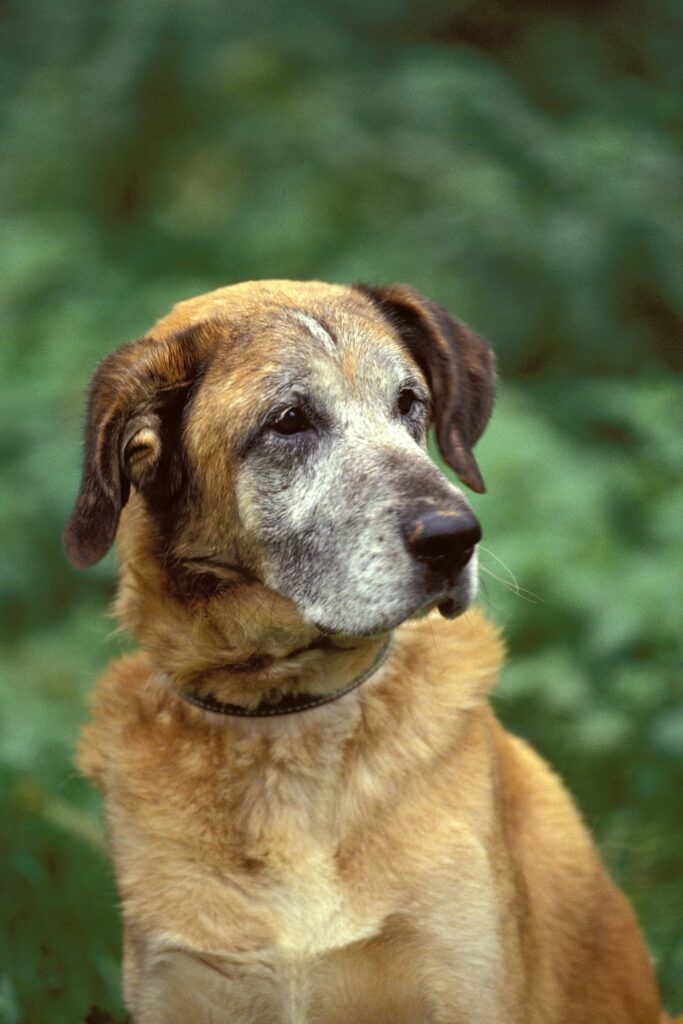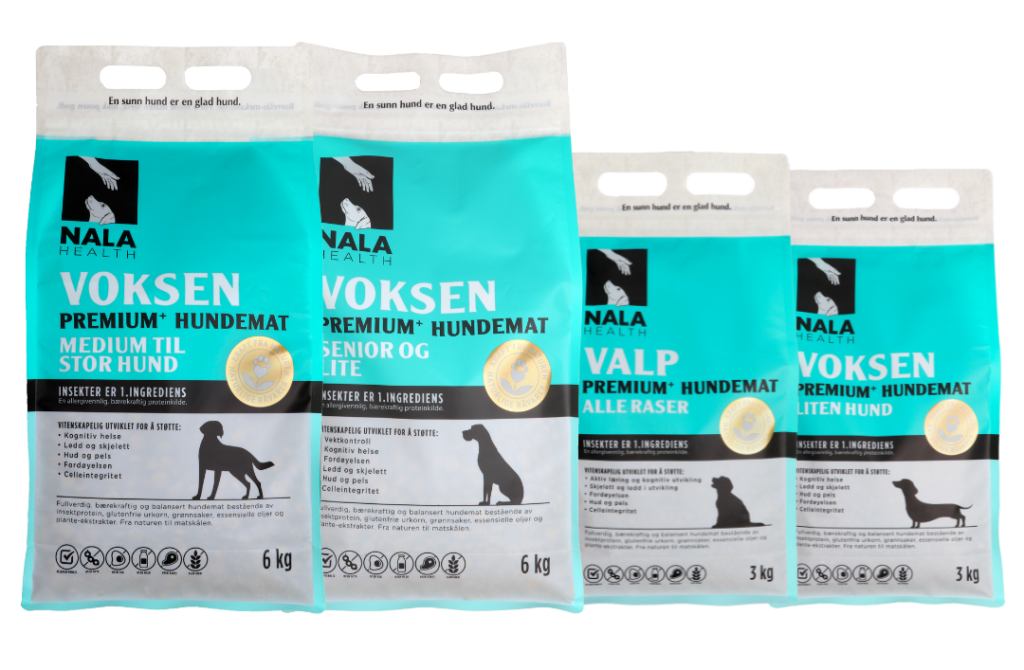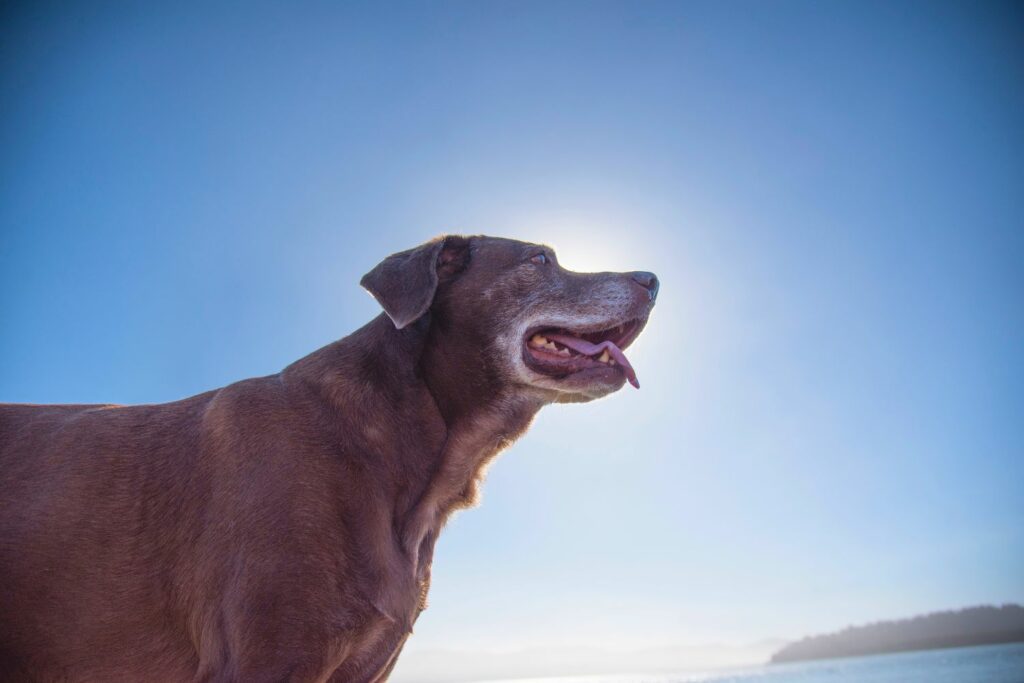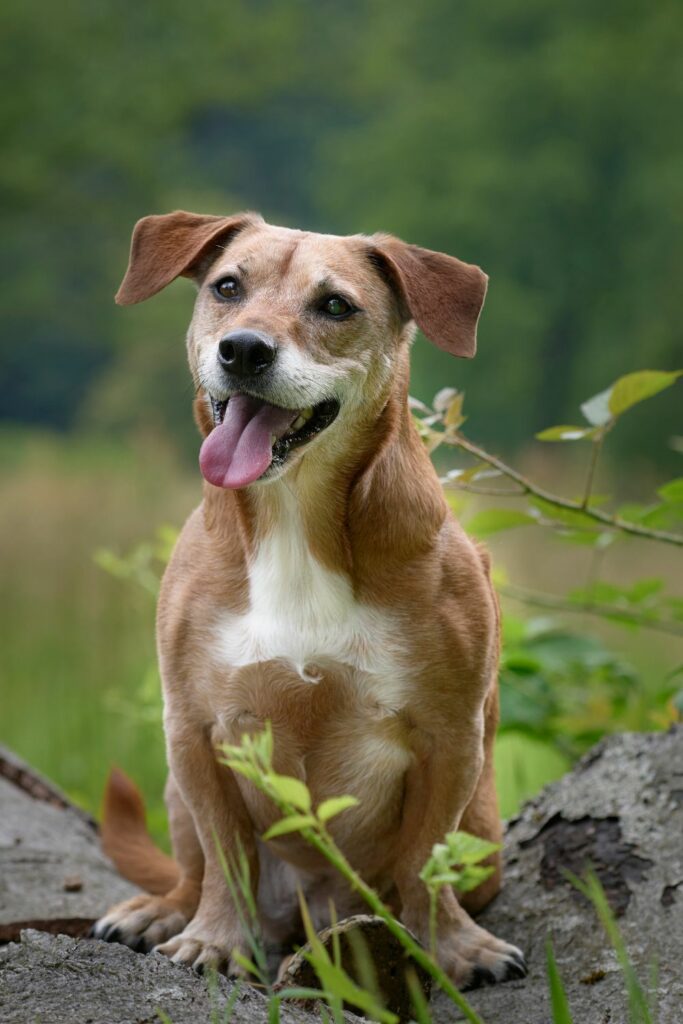Nutritional Needs of Senior Dogs
 Cecilie Hemsen Berg
Cecilie Hemsen Berg
As our dogs age, the transition can seem sudden. One day they’re bursting with puppy-like energy, and the next, they’re lagging behind us on walks. However, the golden years can still be fulfilling for our pets. Each dog ages differently, and it’s essential to understand that ageing isn’t a disease in itself. Proper nutrition remains paramount. A well-balanced diet can not only support their overall health but significantly improve their quality of life in their later years.
“Dogs come into our lives to teach us about love, they depart to teach us about loss. A new dog never replaces an old dog. It merely expands the heart.”
Unknown
When is Your Dog Considered Senior?
The age at which a dog is considered “senior” can vary depending on several factors, primarily breed and size. Larger dogs tend to enter their senior years earlier than smaller dogs. Here’s a general guideline:
- Small and toy breeds: Such as Dachshunds, Boston Terriers, and Bichon Frises. They often don’t begin to show age-related changes until they’re around 10 or 11 years old. They have a life expectancy of 12 – 15 years.
- Medium-size dogs: Such as Cocker Spaniels, Beagles and Border Collies. They can be thought of as seniors when they are around 8 to 10 years old and they have a life expectancy of 10 – 14 years.
- Large-size dogs: Such as German Shepherds, Weimaraners, English Setters and Ridgebacks. They may be considered senior by the age of 6 to 8 years and have a life expectancy of 10 – 12 years.
- Giant breeds: Such as Great Danes, Boerboels, Alaskan Malamutes, and Saint Bernards. Can reach their senior years as early as 5 or 6 years old and have a life expectancy of 7 – 10 years.
Common Signs of Ageing:
- Greying hair, especially around the muzzle.
- Decreased activity or energy levels as well as loss of muscle mass.
- Development of arthritis, dental disease*, aches and pains. This can be noticed by changes in their gate as well as eating.

- Lumps and other skin issues.
- Weight gain or loss due to changes in metabolism and appetite.
- Changes in vision or hearing. You may notice your dog “not listening” to you or struggling to find toys or treats that you throw to them.
- Differences in behaviour such as increased anxiety or clinginess. A more pronounced sleep pattern can also be observed.
*About 80% of all adult dogs have dental problems. It is painful and affects the dog both in terms of appetite and mood. We can prevent this by daily brushing.
Ageing Impacts Nutritional Needs
It is said that 25% of health is linked to genes, while 75% is based on lifestyle (nutrition, activity, rest, environment etc.). Consequently, balanced food plays an important role for how our dogs age. Dogs need complete protein, complex carbohydrates, healthy fats and micronutrients to maintain overall wellbeing. In addition to food, some senior dogs may also need medication to manage diseases.
As our dogs enter their senior years, their metabolic rate slows down, increasing the risk of weight gain. Their digestion also often becomes less efficient at absorbing nutrients. Reduced activity levels could lead to muscle atrophy, while their bones and joints may become more susceptible to conditions such as arthritis, making them less agile. Vital organs like the kidneys and heart also experience wear and tear. A calorie-controlled diet containing healthy, clean sources of protein, fat and complex carbohydrates is important. Probiotics and beneficial fibre also contribute to a well-functioning digestive system. Foods containing extra taurine and L-carnitine help convert fat into energy and help with weight management.
Mentally, some senior dogs experience a decline akin to dementia in humans, known as Canine Cognitive Dysfunction (CCD). Symptoms include confusion, altered sleep patterns, or changes in their interactions with us and other pets. Behaviorally, ageing canines might become less active or more irritable. Senior dogs tend to have a decreased tolerance to stress and changes in their environment. Healthy fats and omega-3 can slow and even combat age-related issues such as dementia and arthritis. Complex carbohydrates provide the brain with energy as well as fibre, vitamins and minerals.

Moreover, external changes such as decreased skin elasticity, a thinning or greying coat, and the onset of eye cloudiness are common. Dog food containing antioxidants can preserve cell integrity and is also important for eye health. Good fatty acids support skin and coat.
Recognising these shifts and consulting with a veterinarian we can modify our routines appropriately, providing the best quality of life for our furry companions in their golden years.
A Balanced Diet for Senior Dogs
Nala Health has meticulously formulated a senior dog food that addresses the unique requirements of older canines, making their twilight years as fulfilling as possible. Our senior dog food not only incorporates a comprehensive range of nutrients targeting key aspects of health but also features smaller kibble sizes to make it easier for older dogs to eat.

For cognitive health, our formula contains marine algae, a rich source of DHA omega 3. This essential fatty acid is proven to enhance concentration, attentiveness, and memory in senior canines. When it comes to supporting their bones and joints, we’ve integrated a balanced mix of calcium, phosphorus, and vitamin D, vital for maintaining strength and flexibility.

A whopping 70% of the immune system is located in the gut, which is why we have placed such importance on this in our formula. The fibre and probiotics in our food contribute to maintaining good intestinal flora and the butyrate maintains the gut lining. In addition to maintaining a resilient immune system a healthy gut is integral to nutrient absorption and even cognitive health.
Dogs who struggle with or are prone to obesity tend to do better on diets moderately high in protein, low in fat, and higher in fibre. This combination keeps them fuller for longer, making it easier to maintain a healthy weight.
Black soldier fly larvae provide complete, clean protein in addition to healthy fats and fibre (chitin). Chicory roots and probiotics support the digestive system. Taurine and L-carnitin are 2 amino acids important for fat metabolism turning fat into energy. In addition, they play a crucial role in healthy heart function.

Feeding Guidelines for Senior Dogs
Due to lower energy levels, reducing the amount of food should be taken into consideration to maintain a healthy weight – it is recommended to feed senior dogs twice daily. Portion control is important, using a scale rather than a measuring cup to make sure they get the correct amount of food every day. In order to maintain a complete diet, look for high-quality senior food.
1. Accommodate a reduced appetite
Pain, disease, medication and mental state can affect your dog’s appetite. If your dog stops eating or shows very little interest in food – consult with your veterinarian to make sure there are no underlying medical causes. Gum disease and toothache make it hard for our old friend to eat. If the vet has ruled out a medical cause, you can try to promote eating by:
- Hand-feeding your dog to entice him to eat.
- Mix in some lukewarm water, bone broth, herbal tea or whole foods like eggs, plain yoghurt, good quality wet food or unseasoned leftovers. This might give your senior dog’s appetite the push it needs. Be aware that some dogs don’t tolerate dairy well.
- Steamed vegetables, like fresh or frozen green beans, broccoli, cauliflower, and butternut make good guilt-free snacks for senior dogs. Cucumber sticks can also be popular.

2. Monitor water inntake
Make sure your dog drinks sufficient amounts of clean water every day – both to keep their body hydrated and to help internal organs to function properly. A rule of thumb is to give our dog 50 ml water per kg of body weight. If your dog weighs 20 kg, he should drink about 1000 ml/1 litre of water per day. If your dog seems to drink very little, you can add lukewarm water to his food.
3. Be mindful of declining health
As mentioned above, ageing dogs are more susceptible to health conditions like kidney disease, tooth decay, arthritis, and cognitive dysfunction. Not only can these ailments affect their general wellbeing, but they can also notably diminish their appetite. Regular vet visits become increasingly crucial to monitor your senior dog’s health and catch early signs of conditions that might be impacting their desire to eat.
Nature’s Pharmacy for Older Dogs
Any supplementation to your dog’s diet should be discussed with your veterinarian to make sure your dog gets a balanced intake of nutrients. Some supplements might also interfere with your dog’s medication.
Regular stools
Psyllium husks can help regulate bowel movements in dogs and prevent constipation or loose stools. Its fibrous nature absorbs water and swells, forming a gel-like substance that adds bulk to the stool. ½ a teaspoon in some water added to their meal once daily. Consult with your vet to make sure this will be an appropriate dosage for your dog.

Metabolism booster
Kelp contains a wide variety of minerals including iodine. Iodine stimulates the thyroid and metabolism, and should be used with caution if your dog is on medication, or has thyroid issues. Kelp can also help the body to remove heavy metals. Balanced intake is essential.
Pain management
CBD oil has increased in popularity for humans and dogs. There are some great options specifically formulated for our dogs. Some are made to help with anxiety and stress, others can relieve mild pain. It is however important to consult with your vet before administering CBD oil to your dog.
Supple joints
Glucosamine and chondroitin help to repair damaged cartilage in dog’s joints. Bone broth and collagen powder are great additions to the diet for the gut, aiding in healing the lining in the colon, in addition to nourishing the skin, joints and muscles.
Coconut oil or olive oil are plant oils that contain ALA omega 3 fatty acids to help with joints, skin, coat and more. Just make sure the oil you use is cold-pressed and extra virgin.

Herbal teas
Brew, cool down and pour onto their food. Consult with a holistic vet before giving your dog herbal teas.
- Rooibos tea: High in antioxidants, especially luteolin and quercetin (the latter is called nature’s antihistamine). Might help with digestive issues, allergies and stress.
- Chamomile tea: Mild anti-inflammatory and calming. Might help with an upset tummy, and mild anxiety.
- Dandelion tea: Can be used as an overall health tonic, especially beneficial for the digestive system, liver and kidneys.
Senior dogs bring a unique, profound love into our homes, marking their presence with the wisdom of age. Just as the greying fur around their muzzle signifies the countless moments they’ve shared with us, so does the change in their needs reflect the progression of their lives. It’s imperative for us, as their guardians, to understand the shifts in their health, behaviour, and daily requirements.

